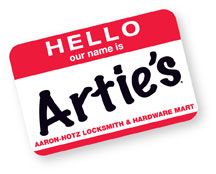In the 1970s, locksmiths in Denmark shared a technique for knocking on a lock cylinder while applying slight pressure to the back of the lock plug. When the pins would jump inside of the cylinder, the plug would be able to slide out freely, thus enabling the locksmith to disassemble the lock quickly. The use of a bump key was not introduced until some time later and was first recognized as a potential security issue around 2002–2003 by Klaus Noch who brought it to the attention of the German media. After further examination of the procedure, a white paper was drafted in 2005 by Barry Wels & Rop Gonggrijp of The Open Organization Of Lockpickers (TOOOL) detailing the method and its applicability.A patent exists for a lock device following the same principle as the bump key from 1926–1928.
The technique then attracted more popular attention in 2005 when a Dutch television show, Nova, broadcast a story about the method. After the method received further publicity from TOOOL presentations at security conference talks, members of TOOOL and a Dutch consumer group, Dutch Consumentenbond, analyzed the capability of the method on 70 different lock models and with trained and untrained users in a 2006 study.
At the same time, Marc Tobias, an American security expert, began to talk publicly in the United States about the technique and its potential security threats. In 2006, he released two further white papers regarding the technique and its potential legal ramifications.
A pin tumbler lock is composed of a series of spring-loaded stacks called pin stacks. Each pin stack is composed of two pins that are stacked on top of each other: the key pin, which touches the key when it is inserted, and the driver pin, which is spring driven. When the proper key is inserted into the lock, all of the key pins and driver pins align along the "shear line", allowing the cylinder to be turned. When no key or the wrong key is in the lock, the pin misalignment prevents the cylinder from being turned.
When lock bumping, the key is initially placed one notch out along the keyway. Bumping the key inward forces it deeper into the keyway. The specially designed teeth of the bump key jiggle all of the pins in the lock. The key pins transmit this force to the driver pins. Because the pin movements are highly elastic, the driver pins separate from the key pins for a split second and are then pushed back by the spring. Even though this separation only lasts a split second, if a light force is applied to the key, the cylinder can be turned and the lock can be opened.
High-quality locks may be more vulnerable to bumping unless they employ specific countermeasures. More precise manufacturing tolerances within the cylinder make bumping easier because the pins move more freely and smoothly. Locks made of hardened steel are more vulnerable because they are less prone to damage during the bumping process that might cause a cheaper lock to jam.
Locks having security pins (spool or mushroom pins, etc.)—even when combined with a regular tumbler mechanism—generally make bumping somewhat more difficult but not impossible. Electronic locks, magnetic locks, and locks using rotating disks are not vulnerable to this attack.
Because a bump key must have the same blank profile as the lock it is made to open, restricted or registered key profiles are much safer from bumping, since the correct key blanks cannot legally be obtained without permission or registration with relevant locksmith associations. While this would make it harder to obtain key blanks, regular keys can be filed down to act as bumpkeys.
Locks that have trap pins that engage when a pin does not support them will jam a lock's cylinder. Another countermeasure is shallow drilling, in which one or more of the pin stacks is drilled slightly shallower than the others. If an attempt were made on a lock that has shallow drilled pin stacks, the bump key will be unable to bump the shallow drilled pins because they are too high for the bump key to engage.
Artie's Locksmith & Hardware has bump proof locks such as ABLOY, KABA, EVVA, Medeco, Schlage, Kwikset and other manufacturers such as BiLock. Click here.

